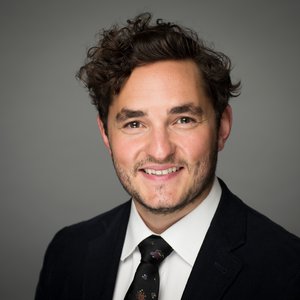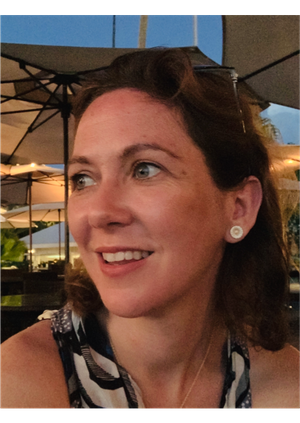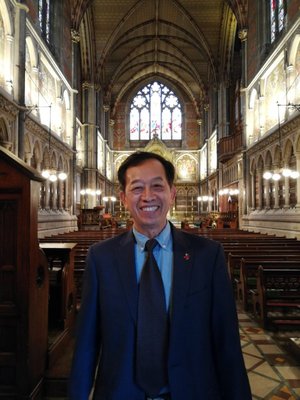Graduate Scholarships
Justin is researching Musculoskeletal Sciences for a DPhil funded by a St John’s scholarship. He writes about what receiving a scholarship has enabled him to discover.
 As a plastic and reconstructive surgery registrar training in the NHS, I have spent the last three years treating patients with cancer and traumatic injuries. Repair and reconstruction of injuries to the hand and wrist form a substantial caseload for plastic surgeons, accounting for roughly 1-in-5 A&E attendances and around 5 million injuries per year in the UK. The hand and wrist are important for social, occupational and recreational activities with injuries often occurring at work, playing sport or in domestic accidents. The most common injuries we see are fractures of the hand and wrist bones, nerve injuries, tendon injuries and traumatic amputations, all of which can cause significant morbidity, loss of earnings and loss of independence for patients. The evidence base for management of hand and wrist injuries has lagged behind other areas of healthcare. In order to get the best outcomes for patients with these debilitating injuries, further clinical research is required.
As a plastic and reconstructive surgery registrar training in the NHS, I have spent the last three years treating patients with cancer and traumatic injuries. Repair and reconstruction of injuries to the hand and wrist form a substantial caseload for plastic surgeons, accounting for roughly 1-in-5 A&E attendances and around 5 million injuries per year in the UK. The hand and wrist are important for social, occupational and recreational activities with injuries often occurring at work, playing sport or in domestic accidents. The most common injuries we see are fractures of the hand and wrist bones, nerve injuries, tendon injuries and traumatic amputations, all of which can cause significant morbidity, loss of earnings and loss of independence for patients. The evidence base for management of hand and wrist injuries has lagged behind other areas of healthcare. In order to get the best outcomes for patients with these debilitating injuries, further clinical research is required.
I began my DPhil at St John’s and the Nuffield Department of Orthopaedics, Rheumatology and Musculoskeletal Sciences (NDORMS) in October 2020. My research focuses on understanding and preventing infections following surgery for hand and wrist injuries. Developing an infection in the hand and wrist following surgery can result in substantial morbidity, including loss of hand function, need for further emergency surgery, prolonged hospital stay and even amputation. Surgical sutures that are coated in an antimicrobial substance: triclosan, may be effective for reducing the risk of infection, but have never been studied in this patient group. I plan to conduct a number of studies that will better define the risk of infection in this patient group, and then to perform a small-scale clinical trial of these antimicrobial sutures to understand their role in preventing infection.
The recent and necessary focus on COVID-19 research has resulted in fewer funding opportunities for surgical research, especially at doctoral level. I have felt the impact of this since the pandemic began, with a number of funding bodies withdrawing fellowships and grants due to financial uncertainty or prioritisation of COVID-19 research. The decision of St John’s to award this scholarship to me has been instrumental in realising my aspiration to pursue my research and I hope will translate directly into better care for trauma patients.
" The decision of St John’s to award this scholarship to me has been instrumental in realising my aspiration to pursue my research and I hope will translate directly into better care for trauma patients. " Justin Wormald (2020, DPhil Musculoskeletal Sciences)
Professor Rebeccah Slater, Professorial Fellow in Neuroscience, is one of the College’s Fellows for Graduate Studies. She explains the invaluable role that graduate scholarships play in College life.
 The College’s graduate community is a vibrant group of 250 students, who study subjects ranging from theoretical chemistry, musculoskeletal sciences, through to social policy, ancient history and film aesthetics. The students have created a thriving international community that sits at the heart of research activities at St John’s. The students’ enthusiasm and passion for learning generates a dynamic atmosphere where their intellectual and personal development is encouraged through numerous college initiatives. For example, the termly Supper Lecture Series allows students to share their academic work with peers and college Fellows in an informal and supportive setting and to be guided in their next steps.
The College’s graduate community is a vibrant group of 250 students, who study subjects ranging from theoretical chemistry, musculoskeletal sciences, through to social policy, ancient history and film aesthetics. The students have created a thriving international community that sits at the heart of research activities at St John’s. The students’ enthusiasm and passion for learning generates a dynamic atmosphere where their intellectual and personal development is encouraged through numerous college initiatives. For example, the termly Supper Lecture Series allows students to share their academic work with peers and college Fellows in an informal and supportive setting and to be guided in their next steps.
To support our students, St John’s offers a number of scholarships to those embarking on graduate study. A key success of our scholarship programme is our ability to partner with external institutions and sponsors to provide additional funding for our students. For example, partnership with UK Research and Innovation (UKRI) has enabled us to offer eight scholarships across the disciplines of Social Sciences, Mathematical, Physical & Life Sciences and Medical Sciences. Some awards provide full course fees and maintenance, such as the Daniel Slifkin Scholarship, which is awarded based on academic excellence to a student studying Civil Law or Magister Juris at the Oxford Law Faculty. Other awards make partial contributions towards the costs of studying. For example, the Dr Yungtai Hsu Scholarship is available to MSc students studying Environmental Change & Management. The College is incredibly grateful for your generous contributions that enable us to support our graduate students in this way during their studies.
As a Fellow for Graduate Studies, I have first-hand experience of seeing how students supported by these schemes flourish during their time at St John’s. I watch talented students dedicate themselves to their study, and see directly how new ideas flourish and become transformed into new knowledge. The Scholarship programme allows us to attract the best minds from a broad range of backgrounds, and ensure that students with diverse interests and skills can join together to share their intellectual experiences. In the coming years, I hope to see the support for our graduate students go from strength-to strength while I watch our current graduates progress and excel in their studies.
" The Scholarship programme allows us to attract the best minds from a broad range of backgrounds, and ensure that students with diverse interests and skills can join together to share their intellectual experiences. " Professor Rebeccah Slater, Fellow for Graduate Studies
Dr Yungtai A. Hsu (1971, Modern History) matriculated in 1971 to read for a degree in Modern History, and then returned to St John’s in 2006 to undertake a DPhil. He tells us about the reason he chooses to support a Graduate Scholarship.
 In life, we accomplish a few memorable things: we learn ideas that shape our thinking and we pass these ideas on to those who wish to learn from us. St John’s is a place which encourages this knowledge exchange. I decided that to help develop the young mindsof St John’s to the fullest would be very rewarding, and this is why I chose to support men and women with potential by establishing a graduate scholarship in 2003, and have been helping students in this way ever since.
In life, we accomplish a few memorable things: we learn ideas that shape our thinking and we pass these ideas on to those who wish to learn from us. St John’s is a place which encourages this knowledge exchange. I decided that to help develop the young mindsof St John’s to the fullest would be very rewarding, and this is why I chose to support men and women with potential by establishing a graduate scholarship in 2003, and have been helping students in this way ever since.
When I first arrived in Oxford in October 1971, it was a cold late autumn near the beginning of winter. I was the only student from Taiwan and everything British was so original and new to me – the antiquity and tranquility of the town and the greenness of the grass and fields in the surrounding areas appeared in sharp contrast to where I came from. Surprised and excited, I began to pursue a postgraduate degree.
I remember my first dinner at St John’s, when President Southern told us that our days at Oxford would be busy and full, and we should get used to it and keep it that way, even after graduation. This is the first lesson that I learnt at St John’s and throughout my life it has remained the most inspiring piece of advice I have received: we should never waste our most limited resource, time.
After I obtained my BLitt in 1974 (later reinstated as an MLitt), I returned to Taiwan before migrating to the USA. Although I wished to stay in academia, I ended up in the shipping and logistics business. In 2005, I attended a St John’s reunion in New York and met many old friends who used to live on Museum Road and spend evenings at the Lamb & Flag. Having become tired of running my own business – though successful, it had become monotonous without much intellectual stimulation – I was inspired by my reconnection with Oxford. I asked around about pursuing a higher degree and, under the encouragement of President Michael Scholar, I reapplied to the University and was accepted by St John’s, this time to pursue a DPhil in economic history.
Returning to St John’s in 2006, 32 years after graduating with my BLitt, on the surface everything seemed to have changed. Oxford is not as tranquil and quiet as it was in the 1970s, now that there are so many tourists and businesses. But my academic life remained unchanged: busy and full. The tradition of seeking truth and knowledge at Oxford still carries on and I was thrilled to live and study again in one of the best colleges in Oxford.
Whenever I think about how St John’s gave me the opportunity to nourish and grow my mind, an opportunity which has impacted my life in many ways after leaving Oxford, I feel obliged to give back to St John’s, to pass on the same blessing to today’s promising students. It is very gratifying to see them flourish and knowing that I have played a part in their achievements.
" Whenever I think about how St John’s gave me the opportunity to nourish and grow my mind, an opportunity which has impacted my life in many ways after leaving Oxford, I feel obliged to give back to St John’s, to pass on the same blessing to today’s promising students. " Dr Yungtai Hsu (1971, Modern History)
We would like to take this opportunity to thank every single donor who has chosen to support our graduate students. Click here to find out more about how you can support our students.